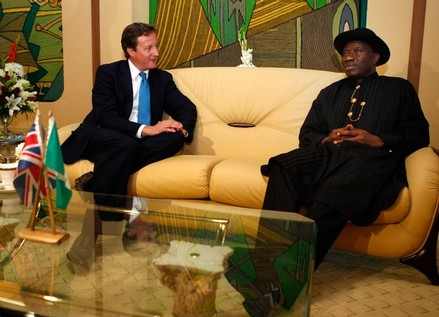Aid Britannia: Aspirations vs. Politics

British Prime Minister David Cameron and Nigerian President Goodluck Jonathan talk during a meeting at the State House, on July 19, 2011 in Lagos, Nigeria – Getty Images
The Economist recently ran an article that highlights the tension between spending on foreign assistance and domestic political support for it. Prime Minister David Cameron, who ran on a platform supporting more aid and has insulated it from the cuts he has levied on almost every other part of government, is the latest to find himself in this political quandary. On a recent trip to Africa he tried to strike a tone that would please audiences at home and abroad:
In Lagos, Mr Cameron painted a vision of British aid as a catalyst for economic growth. To reassure “aid sceptics” back home, who worry about money going astray, Britain will focus its cash on things that are “quantifiable and measurable”, such as campaigns to vaccinate millions of children, he vowed. The prime minister talked of unclogging regional and international trade with investments in new internet links, roads and more professional customs services. He positively boasted that he had flown to Africa with a plane “full of business leaders”. Yes, Britain should help the starving and those ravaged by war, drought and disease, he said; but growth, nurtured by free trade and political reforms, had the potential to wean Africa off aid altogether.
As Britain moves to reduce the size of its armed forces Cameron is seeking to position the country as an aid superpower. As the chart below indicates, Britain already has a preponderance of soft power. But is it sustainable (politically or financially) in lean times?

Cameron might want to look to the American case of the perception-reality gap in managing the politics around foreign aid (see below from Sarah Sullivan at the PBS News Hour):
When asked in a recent poll how much the U.S. government spends on foreign aid, Americans vastly overestimated the amount — which might explain why politicians look to that area first when considering budget cuts, some analysts say. The survey, conducted by the WorldPublicOpinion.org project at the University of Maryland’s Program on International Policy Attitudes, asked the question: “What percentage of the federal budget goes to foreign aid?” The median answer was roughly 25 percent, according to the poll of 848 Americans. In reality, about 1 percent of the budget is allotted to foreign aid
“Foreign aid is clearly on the chopping block these days,” says James Lindsay, director of studies at the Council on Foreign Relations. “The public’s inflated sense of foreign aid spending helps explain why so many politicians are quick to volunteer aid programs for the budget axe.”
